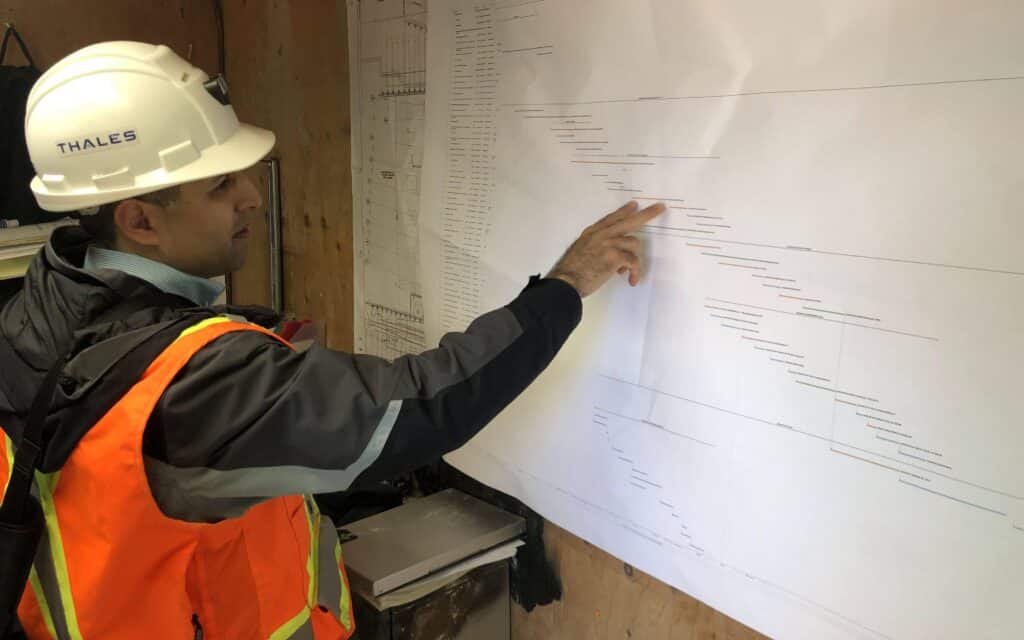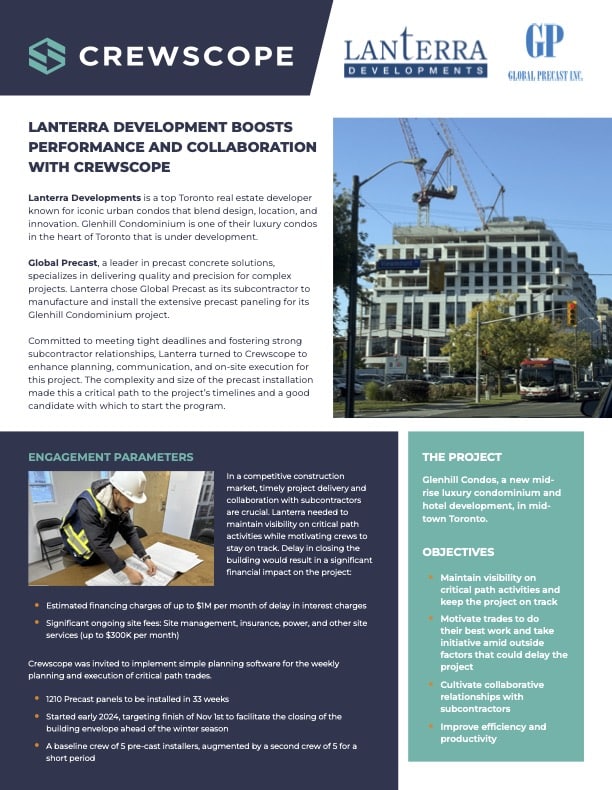
If you’re in construction, you know the importance of keeping projects on schedule. Construction jobs are bid at a fixed cost with a projected schedule, so any delays will reduce the profitability of the project, if not make it unprofitable.
Having your construction crews set weekly goals is one of the most effective ways to keep projects on schedule. Goals help workers align on what they need to accomplish while breaking larger goals down into smaller, weekly objectives helps tie incentives with performance.
When you set smaller, weekly goals that align with the larger schedule, if something goes wrong, there is plenty of time to react and adjust plans to keep the overall plan on track. If crews start discussing it at the end of a larger phase, there isn’t much that can be done to get the target back on track.
In one large heavy civil construction firm we’ve worked with, rolling this method helped all three critical projects stay on plan. One of them even beat the schedule by 25%.
How to Set a Motivating Goal
The S.M.A.R.T. goal framework is one of the most popular and effective ways to set objectives.
The S.M.A.R.T. framework is a set of criteria for goals that need to be:
- Specific: What will we accomplish? What actions will we take?
- Measurable: What data will measure the goal? How will we know if we are successful?
- Achievable: Is the goal doable? Do we have the necessary skills and resources?
- Relevant: How does the goal align with broader goals? Why is the result significant?
- Time-Bound: What is the time frame for accomplishing the goal?
Goals are typically measured by the revenue-generating activity (meters of pipe installed, loads of dirt excavated, cubic meters of concrete placed, etc.). As the best practice is to break down big goals into smaller, weekly goals, a good goal to set would describe what needs to get done by the end of the week in order to stay on pace to complete the project on schedule.
Here is an example of a S.M.A.R.T. objective for a bulk excavation crew: excavate 750 loads of dirt with 250 labor hours, based on a team of 5 working 10 hours a day for five days.
There is a limitation to the S.M.A.R.T. framework, however. It doesn’t cover the soft skills of goal setting. Soft skills are as crucial as a well-defined goal. Keep in mind that goal-setters will most likely have to incorporate soft skills on top of their well-defined goals.
How to Incentivize Goals
After setting a goal, it’s important that you incentivize your team members to accomplish the goal. Sometimes, an intrinsic incentive of doing a good job is enough, but providing a reward that aligns with the company’s incentives tends to be the most powerful motivator and creates a system that makes hitting goals a consistent, repeatable process.
We recommend starting with one dollar per hour. Our research with laborers and operators indicates this is a meaningful bonus that will get workers to pay attention. But it is not enough to take unnecessary safety risks or cut corners on quality.
The average construction worker earns $2,000 per week ($40/hour x 50 hours per week). One dollar per hour or $50 per week is a meaningful bonus, big enough to be meaningful but the hourly rate is still the focus of the compensation package. When we tested value with workers, some would say happily, “$50 is a tank of gas”.
Once this level of goal is accomplished consistently, you may decide to increase the productivity goals and the rewards. However, the most important thing for crews to optimize for is delivering accurate forecasts. This is more important than having them constantly trying to smash productivity targets as construction projects make money when they stay on schedule.
Rules for Success
Be Objective
When measuring the success of your goals, and paying rewards for it, staying true to the process and being objective is essential. Calling near wins a success erodes the impact of the whole process. The objective has failed if we do not achieve our goal. NO EXCEPTIONS.
It’s best to avoid goals as “almost met” or something similar. While it might provide a bit of a good feeling for the team, it adds discretion to reward payout and will cause more problems in the future.
Learn from Failed Goals
If you’re following the previous rule, you will definitively know whether or not you’ve succeeded with your goal or not.
In the times where your team failed to accomplish your goal, it’s a good practice to do a retrospective analysis (retros) as a team to learn what went wrong and how you can improve for the next goal. A retro has three categories: ‘start doing,’ ‘stop doing,’ and ‘keep doing.’ Typically, team members will prepare their thoughts in advance and share them individually.
If you do this consistently after every failed goal, teams will be determined to deliver more wins!
Celebrate Wins
In the times when your team successfully accomplished a goal, it’s time to celebrate your team for a job well done! If there were rewards that were promised upon successful completion, make sure they’re paid out promptly.
Just as important as a reward is acknowledgment and appreciation. As a team leader, it’s important to show your appreciation through your words. Sometimes, this is more meaningful than the rewards as they will get confirmation that their work is valued.
It also helps to showcase and give credit to your team to management, superiors, and publicly through social media or newsletters.
Start Easy
Crews are much more likely to build goal setting into a habit if you start easy with goals that can be accomplished and increase the difficulty and reward as they continue to win.
Give crews a taste of winning, just like at a new casino. Start easy with the expectation that they will be successful. Over time, we will increase the difficulty, but only once we hook workers on the process, not the specific reward value.
Goal setting is something that people at Crewscope enjoy being experts on. The ability to share our expertise and help construction companies and crews set meaningful goals that drive progress for the project but also bring a sense of purpose to workers who value being productive is something we are very happy about. We are constantly surprised by how much of a difference it can make in the productivity and happiness of the teams.



